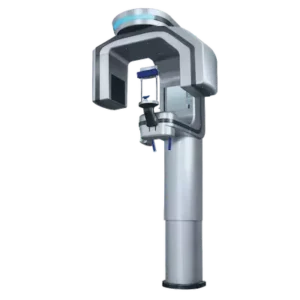 Dr. Sammy Noumbissi will likely request a CBCT scan when being evaluated for dental implants. You may have some questions if it’s your first time having one of these scans done. Our professionals are here to answer all your questions or concerns about CBCT scans and why we use them here in our Silver Spring, Maryland office.
Dr. Sammy Noumbissi will likely request a CBCT scan when being evaluated for dental implants. You may have some questions if it’s your first time having one of these scans done. Our professionals are here to answer all your questions or concerns about CBCT scans and why we use them here in our Silver Spring, Maryland office.
What is a CBCT Scan?
CBCT is an acronym for cone-beam computed tomography. The CBCT system used by dental professionals rotates around you and captures the data using a cone-shaped x-ray. A CBCT scan captures about 150-200 images from various angles in less than a minute. The detailed data captured are used to reconstruct a 3D image of your jaw, teeth, mouth, neck, ears, nose, and throat (ENT).
What Is The Difference Between A CBCT Scan And Traditional X-Rays?
You may have received or heard about full mouth x-rays or panoramic x-rays from a dentist.
- Full Mouth X-Rays (FMX) — Your dentist typically takes these every 3-5 years. The FMX captures images of every tooth and the surrounding structures. Dentists use full mouth x-rays to diagnose gum disease, cavities, dental abscesses, and lesions.
- Panoramic X-Rays (PANO) — Single picture image is most often used by orthodontists and oral surgeons. This type of x-ray does not provide excellent detail.
Compared to these traditional x-rays, a CBCT scan is a much more effective and detailed method of capturing information about your overall dental health. The CBCT technology also uses much less radiation and requires fewer scans to see the various views and angles of your mouth. Additionally, unlike traditional dental x-rays, the cone beam CT scan shows both bones and soft tissues.
What Are The Benefits Of CBCT Scans?
A beautiful, healthy smile starts with a foundation of healthy bones and gums. CBCT scans are essential to providing high-quality periodontal care and helping you achieve overall dental health. There are many advantages to getting a CBCT scan:
- Better image quality and accuracy
- Includes comprehensive information about your oral health
- A lower dose of radiation
- Comfortable and quick experience
Why Is A CBCT Scan Necessary?
CBCT scans show all your bones, nerves, and soft tissues in great detail so Dr. Sammy Noumbissi can diagnose your health and plan your treatment plan before he even begins a procedure. This technology is crucial in planning and successfully placing a dental implant. CBCT scans help your dentist:
- Provide accurate measurements, like the shape and dimensions of your jawbone
- Identify gum issues
- Detect lesions that may indicate severe disease
- Locate the origin of any oral pain
- Evaluate your sinuses, nerve canal, and nasal cavity.
CBCT Scans For Zirconia Dental Implant Treatment
A CBCT scan is an essential part of modern zirconia dental implant treatment. This technology makes it easy for our dentist to take a complete virtual model of your bones, teeth, and soft tissues and provide better outcomes. CBCT scans help our dentists:
- Accurately design the proper bite and reduce the risk of misaligned implants
- Measure and locate the available jawbone, location of the maxillary sinus, and sensory nerves
- Select the right size and length of implant for optimal stability, safety, and integration
